
There is not a shrink in the world who does not believe rage and hatred are projections, people reflect what they have seen and what was done to them onto others, they never see themselves in the mirror. Once I fully accepted that, I began to understand the power of forgiveness and what forgiveness actually means.
Rage is a part of all of us, but Clarissa Estes writes about it in a useful and compelling way in her book Women Who Run With Wolves. I know people who claim they never feel anger or rage, and I think they even believe it, but I would not wish to live too long inside of their heads. One way or another, there is a reckoning with truth.
Rage can become a dam to creative thought and action, to love and community. My health and growth depends upon my learning how to soften and change it.
I have often used anger to empower myself, as many women have learned to do – have needed to do. I believe rage has been essential for me as a way to work through the outrage I have felt over the cruelty, abuse, neglect, lack of respect, arrogance and ignorance that I have encountered – that we all have encountered – in life.
The human soul can be a beautiful thing, or a nightmare. That is the beauty and magic of us.
Rage helps us protect ourselves and our dignity and identity sometimes. But I learned in my talking therapy that I couldn’t carry it around inside of me forever, I had to cleanse myself of it, to begin to let it go. Otherwise, I would simply not have enough room in me for love and meaning.
People often mistake rage for passion and conviction, for fervent belief, but I believe it is rarely that. Taken too far, and for too long, it is a disease of the mind, a kind of bile and poison. It rots away the better parts of us.
I carried it inside of me for a long time, I think one of the great things about getting older is that some of the bad genes die out.
“Now, I’m not going to tell you a big, fat lie,” writes Estes, “and say you can cleanse all of your rage today or next week and it will be gone forever.” The angst and torment of times past rises up in the psyche, she writes, recurs and recurs. “But it should leave a light ash, not a hungry fire.” I like what she writes about anger, and implicitly, about the need for forgiveness. For how else do we cleanse ourselves of anger and rage?
We humans are impulsive and impatient. We shy away from the long view, we want to believe we can just will ourselves into health and peace of mind.
I have learned that forgiveness is not a symbol or static New Age idea, or even the exclusive tenet of religious faith, although every great spiritual leader has preached it. Forgiveness is profoundly liberating. To carry rage around is exhausting, not exciting. It brings with it fear, cynicism, hopelessness and disconnection.
What, I came to wonder, had rage ever done for me? What kind did it change, what relief did it bring, what justice did it serve? I know of no problem hatred and rage has ever solved, not in my life, not in the wider world.
Estes writes that forgiveness, the opposite reality of rage, is not a singular act to be completed at one time, in one sitting. Forgiveness has many layers, many times and seasons.
For me, forgiveness is a process, not a decision. I didn’t decide one day to forgive my parents, I considered and re-considered them and my life with them, looked at them from a distance, and through the prism of my own failings and shortcomings, as a person, a husband, a parent, as a human being with some years of experience. One day I just wasn’t angry at them any more, I kept thinking they did the best they could, just like me. Just like nearly everyone.
And in forgiving them, and other people I was so angry at for much of my life, I also learned that I was also forgiving the person I was most angry with: me. When I forgave them, I began to forgive myself. I did the best I could.
And I began to be free.
